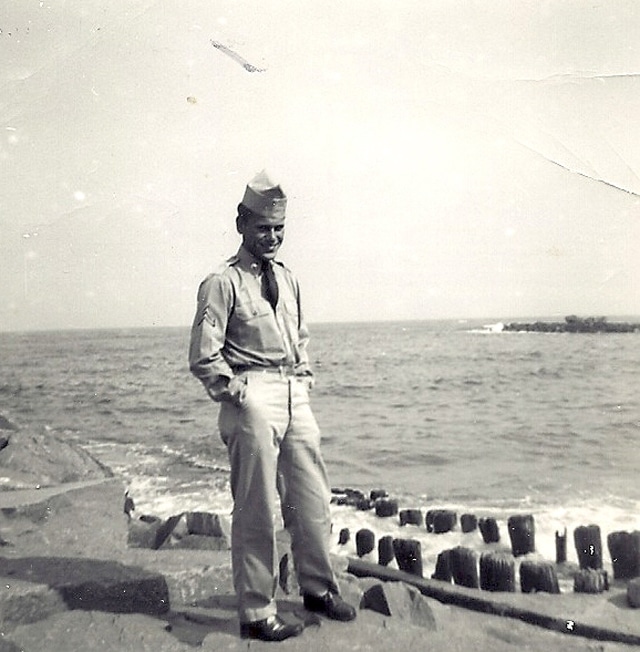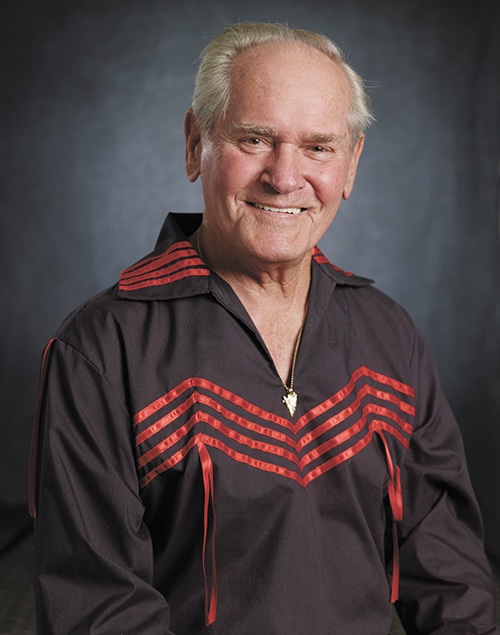On April 21, 2020, CPN District 1 Tribal Legislator Roy Slavin walked on. He will be truly missed by those he served in the legislature as well as those throughout the Nation in whose service he worked. In 2013, the Hownikan profiled him. That article follows along with his obituary.
One of the eldest representatives on the Citizen Potawatomi Legislature, Kansas City, Missouri’s Roy Slavin has seen the vast changes Native Americans have gone through during the past century. Born in St. Joseph, Missouri, Slavin represented District 1 since the August 2007 CPN constitutional revision, which created the current legislature.
Though he had long been affiliated with the Tribe and its activities, he saw running for office as a chance to continue his Potawatomi family’s legacy.

“We had scheduled our Slavin family reunions around the old Potawatomi powwow during the summers in Shawnee, so I had plenty of time to attend and see the Tribe grow over the years,” he said. “When they created the legislature, I saw it as an opportunity to serve despite my location in Kansas City.”
The Slavins are one of the largest CPN founding families, and his great grandmother was a survivor of the Potawatomi Trail of Death. His uncle, Jim Slavin, was with the original settlers who set out from Kansas to establish what is today the Citizen Potawatomi Nation in Oklahoma.
“My father was always proud of his Potawatomi heritage,” Slavin recalled. “But it was during a time where we didn’t advertise it. As kids, we knew we were, but it wasn’t something we talked about a lot. Though growing up, I would on occasion tell people I was ‘half Catholic and Indian.’”
Entering the U.S. Army at the age of 17, Slavin narrowly missed serving in the Korean War. His orders were cut before the war began, and the Army Signal Corps member was sent to serve on the then-classified Operation Greenhouse.
Taking place on Enewetok Atoll in the Marshall Islands, Operation Greenhouse was the early 1950s program for thermonuclear testing. His presence during this operation gave Slavin a distinction that not many CPN members or humans can claim – an eyewitness to four thermonuclear explosions.
Slavin’s time in the Army also provided training that shaped his professional career later in life.
“I was fortunate enough to attend two of the best radio operations and repair schools around when I was stationed at Ft. Monmouth,” he said.
Once out of the service, Slavin utilized his expertise as a radio repairman in Kansas City. He worked for a number of shops around the city before owning his own, eventually finding his way to Trans World Airlines as an avionics technician. Slavin retired from TWA after 28 years of service and sought a new opportunity to serve fellow Citizen Potawatomi as a legislator in 2007.
Throughout his life and time representing CPN members in the country’s northeastern and Midwestern states, Slavin experienced both the positive and negative changes Native Americans have endured over the past half century.
“I’m glad to see my kids, grandkids and great-grandkids involved with the Tribe in ways that those people my age just weren’t able to back then,” he said. “I look at my great-granddaughter, Mollyann, who has never missed a CPN Family Reunion Festival, who knows how to dress in proper regalia for Grand Entry, and it makes me proud to see how far we’ve come.”
Slavin was a staple at many regional and Tribal gatherings, along with his longtime wife Julia. He will be missed greatly.
Obituary
Roy Slavin, age 87, passed away April 21, 2020, after a lengthy battle with lung disease. He was born at Weatherby, Missouri, to Roy and Irene Slavin. Roy grew up in St. Joseph, Missouri. When he was young, he boxed in the Golden Gloves and spent many hours at the roller rink. In February 1950 at age 17, he joined the U.S. Army. His basic training was at Ft. Knox, Kentucky. After basic, he attended electronic school in Fort Monmouth, New Jersey. Upon finishing electronic school, he was awarded a Q Clearance by the Atomic Energy Commission for his tour of duty at Eniwetok in the Marshall Islands. This assignment was called Operation Greenhouse, which was the testing of the first hydrogen bomb.

When he returned to Fort Monmouth, he was honorably discharged in March 1953.
In May 1952, he married Julia, and they had three children, Rod, David and Verna. After his discharge and return home, he worked installing and repairing televisions. Roy was employed at Trans World Airline from January 1966 until his retirement in September 1994. He worked mostly in the avionic shops. In 1966 , he worked at the Internal Revenue Service in the extraction department before retiring from the IRS in May 2008 to accept an elected position with the Citizen Potawatomi Nation as a legislator for District 1. He continued this position until his passing.
It was always a toss-up as to which job he enjoyed the most, TWA or Citizen Potawatomi Nation. CPN finally won out, as he was so honored to serve as a legislator for District 1 and spent many hours learning and teaching his family the culture. He was always proud to be Potawatomi even though the past was not favorable to Indians.
Roy was preceded in death by his mother and father, five brothers and one sister. Survivors include his wife of (67 years) Julia; sons, Rodney Slavin (wife Karen), of San Diego, California, David Slavin of Kansas City, Missouri; daughter, Verna Brooks (husband John) of Shawnee, Oklahoma; eight grandchildren and 12 great-grandchildren; one sister, Patricia Myers of Liberty, Missouri; and many nieces and nephews.
Private services were held April 27, 2020, at Newcomer’s White Chapel Funeral Home, in Gladstone, Missouri, with burial at Leavenworth National Cemetery in Leavenworth, Kansas.
